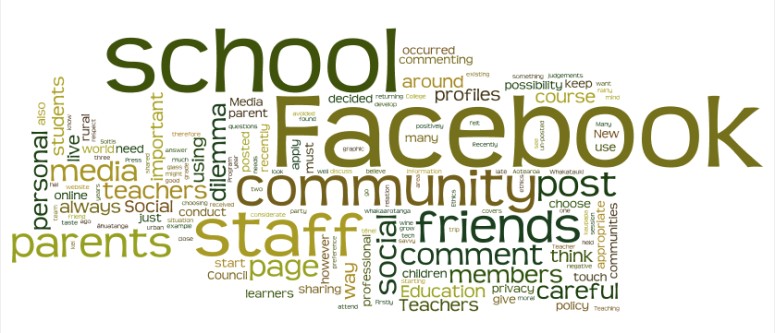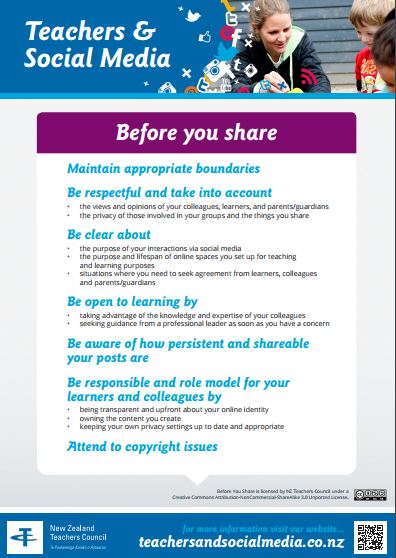 “We believe that we have a moral obligation to grade students fairly, that is, to give them what they deserve. We would prefer to give them all A’s. Moral judgements are not, therefore, statements of preference or taste.”
“We believe that we have a moral obligation to grade students fairly, that is, to give them what they deserve. We would prefer to give them all A’s. Moral judgements are not, therefore, statements of preference or taste.”
Strike, K.A. & Soltis, J.F. (2009). The Ethics of Teaching. New York, NY: Teachers College Press
Whakatauki
He maha nga kaupapa kei roto i tēnei āhuatanga hai whakaarotanga.
There are many elements to consider in the situation.
I have chosen to look at the ethical dilemma of social networking. Our school is about 20 minutes from a main centre. We draw our students from two distinct communities. Firstly the urban community directly around the school and secondly the more rural community which covers a much larger area. Many teachers at the school live as part of the community and choose to have their children attend the school. Recently the school has decided to use Facebook as a way to keep in touch with the parent community. A Facebook page has been created and many parents, staff and community members follow the page. This has been received very positively.
The first dilemma is that some teachers are choosing to post comments to the page using their personal Facebook profiles. This then opens up the possibility for parents and students to locate them on Facebook. With one comment or post, teachers are opening themselves up to the possibility of sharing information with the community that they might not intend on sharing. This of course depends on the privacy options they choose, however as some of the staff are not tech savvy the question must be asked if they know how to change their privacy settings? Should staff comment on the school Facebook page using their personal Facebook profiles?
A second dilemma is that as some teachers live in the community and are friends with other community members they are of course friends on Facebook. Is it appropriate to be Facebook friends with parents?
The third dilemma, which has occurred recently, is when staff members who are also school parents comment about the school on Facebook. This occurred recently when a school trip was late in returning. A staff member who is also a parent posted a negative comment, which of course all her Facebook friends (including staff and other parents) could see. Should staff be commenting on Facebook about the school?
I myself do have a personal Facebook account but I am very careful what I post and who I ‘friend’. To me it is a way to keep in touch with my children and close friends. My husband has decided he does not want an online presence on Facebook or any other social media so I must always be careful to respect him in what I post as well. I am friends with some staff members from my school, however I am starting to rethink that choice. As teaching professionals we are held in high regard in relation to our behaviour. (Connecticut’s Teacher Education and Mentoring Program, 2012) Since qualifying over 10 years ago I have always been careful to conduct myself in public with this in mind. I live and work within a small rural community and have always felt it is important to conduct myself as a professional. An example of this is that I would go and have a meal and a glass of wine at our local, but I would not head down with friends for a party or drinking session! The code of ethics I apply to myself in the ‘real world’ are just as important (if not more important) in the online world. Once something is posted it cannot be un-posted. The graphic I found on the Teachers & Social Media website is a great place to start, and I think this needs to be shared with the wider staff at our school.

I am in no way saying that Social Media, or Facebook should be avoided. We just need to be careful and considerate of our professional responsibilities before we post. As the Education Council points out:
‘Social media can be an effective tool for engaging with learners and communicating with parents, whānau and communities. Teachers who model good social media use will grow learners who apply positive, respectful values in their interactions on social media platforms.’ (Education Council of Aotearoa New Zealand, 2016).
As a school I think we need to develop some policy around this issue and I will be bringing this to the attention of our leadership team and BOT. I am new to the school this year but have not come across any existing policy around social media and communication so I think this should be made a priority. Then we will be able to discuss and answer the three questions at the start of my post:
- Should staff comment on the school Facebook page using their personal Facebook profiles?
- Is it appropriate to be Facebook friends with parents?
- Should staff be commenting on Facebook about the school?
References:

Hi there
This is a very good idea for an ethical dilemma. I remember a few years ago there was a spate of students wanting to befriend some of the teachers on Facebook. Some of us did accept. This issue was discussed at a staff meeting where the leader of out ICT team pointed out the perils for us as teachers and our underage students. I think befriending parents is just as tricky. I agree with you that we need to be careful and considerate about what we post and who we befriend. One idea I try to instil in my students is that if they post something that is not sensible, it can never be fully erased and it may embarrass them later in life.
LikeLike
Hi Upetrus,
Thanks for your comment. In my previous position at a High School I often had students sending me friend requests. It was even trickier as I had three children of my own of varying ages whose friends would also friend request me. Although the school didn’t initially have a policy on this I decided not to accept any friend requests from students as I felt it crossed ethical boundaries. A number of other teachers did not agree however and did accept friend requests from students. This did in turn prompt the school ICT Team, which I was a member of, to develop a guideline for staff that you should not be friends with students. Sometimes things that make sense ethically to one teacher may not to another so policies and guidelines need to be put in place to protect us. I like your last thought – that what we post can never be erased and can come back to embarrass us later. I think that’s a lesson we can all learn as it’s often easy to forget and post a silly pic of oneself or others without even thinking about the consequences, especially for ourselves as professionals.
LikeLiked by 1 person
I am a bit like your husband and have been reluctant to join the social media scene for a number of reasons – privacy, time, prefer to yarn on the phone or face to face. However as my children have gone on their OE’s I am finding I am using these platforms more frequently. Your questions have made me think. You are right – those of us who are not as computer savvy as others could inadvertently commit an ethical blunder. I too teach at a rural school and the social networks run hot. There is no room for error in a small community. I answered ‘no’ to all the questions you raised. The graphic you posted is great – thanks for that I will draw it t the attention of the staff at school. Thanks Bron from Heather Kershaw
LikeLike
Thanks Heather. This assignment has certainly made me think twice about what and how I post. I’m glad the post resonates with others too. If nothing else at least we are more aware and can help others on staff to also be more aware of these possible ethical dilemmas. All the best, Bron
LikeLike
I like your three main questions. around this dilemma: Should staff comment on the school Facebook page using their personal Facebook profiles?Is it appropriate to be Facebook friends with parents? Should staff be commenting on Facebook about the school?
Living and working in the 21st century, we have seen technology evolve very quickly and we have access to Social media at the push of a button. I remember being on practicum when I was studying and having a few of the children try to add me on Facebook, and this was when Facebook was still in the early days of popularity. I believe there is a fine line, but as a professional we have to be very conscious of what we allow others can see in our lives. Even if you are friends with other staff members, and for personal reasons they happen to be friends with parents on Facebook, if you colleague ‘likes’ something on your page they parents can see it. We are still human at the end of the day but more in our chosen profession need to be wary of what they set themselves up for and as you said it cannot be erased and it could come back haunt us later.
LikeLike
Hi Ashlee, thanks for your comment. The more I think about it the more I think we need a school policy around this. As you say, the reach of social media is often forgotten. I am friends with colleagues who are friends with parents, I’m starting to re-think that decision. It would only take one Facebook friends tagging me in on something inappropriate to possible cause an ethical dilemma. This is definitely something that needs to be discussed more at a professional level. All the best, and thank again for commenting, Bron.
LikeLike
HI there
Really liked this post. We too as a school have a facebook page, where we share student success at all levels. It is used as a platform to help keep our social media savvy whanau, as informed as possible. But like you said in your Blog, Keeping professional and reminding oneself what is appropriate to be posted. I have had parents and students (under the legal age) try to add me on facebook, which I assume they found through the school account, but have decided to keep my professional life separate to my private life. I think this may be easier because I don’t live within the same community that my school whanau live in. But definitely an interesting dilemma that i guess many schools are finding themselves in.
LikeLiked by 1 person